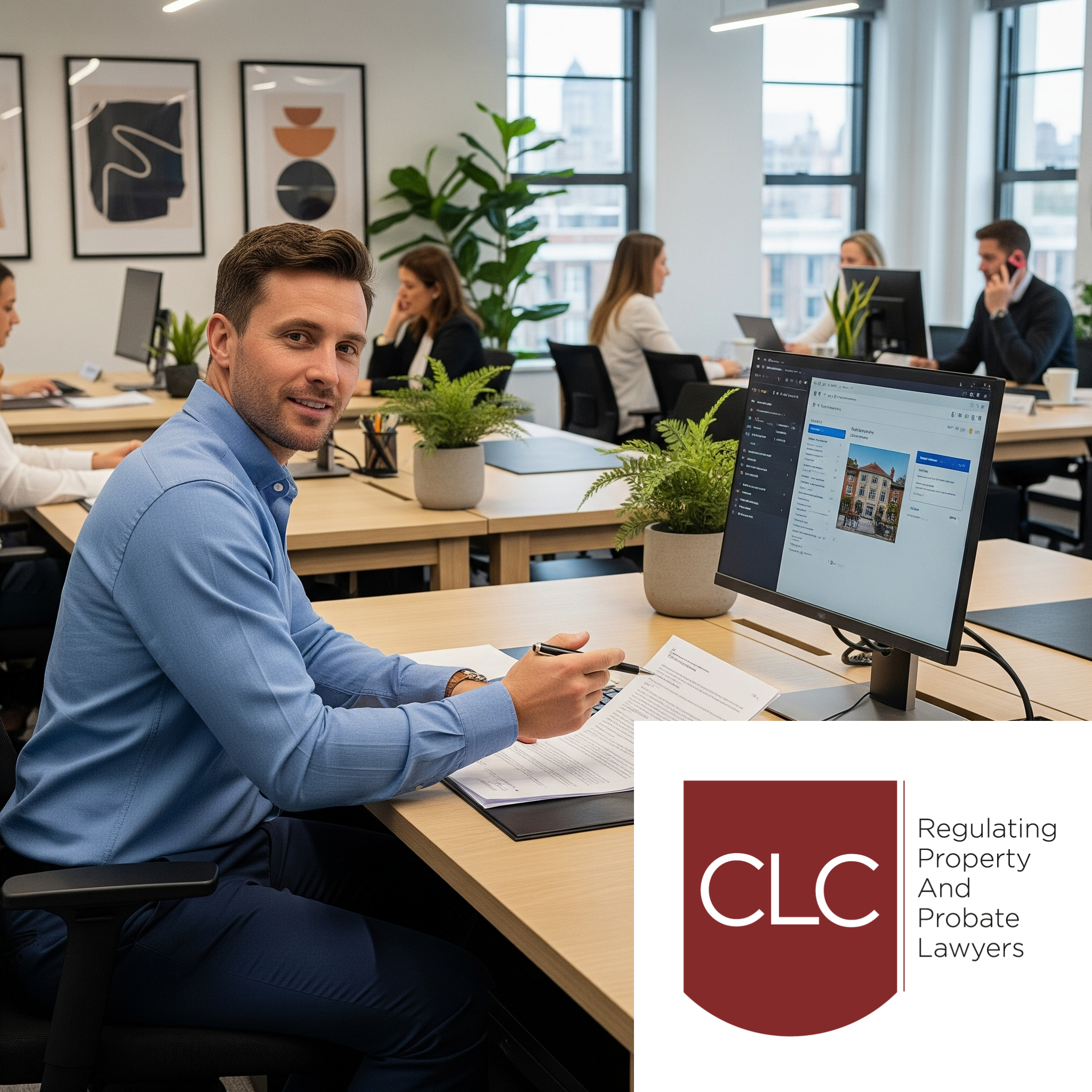Becoming a CLC Registered Manager: Key Roles and Responsibilities Explained
As a Licensed Conveyancer, you're already on the efficient CLC framework – discover how straightforward it is to add valuable probate expertise and serve clients more comprehensively.
Published: 24 May 2025
If you're a Licensed Conveyancer or Licensed Probate Practitioner aspiring to a leadership position within a CLC-regulated practice, understanding the role of a CLC Registered Manager is crucial. This status signifies your appointment to a significant management role and comes with distinct responsibilities and rigorous regulatory oversight from the Council for Licensed Conveyancers (CLC).

What Exactly Is a CLC Registered Manager?
A CLC Registered Manager is an individual formally recognised by the Council for Licensed Conveyancers as holding a key managerial or ownership position within a CLC-regulated firm. This designation ensures that those with substantial influence over a legal practice meet the CLC's stringent standards for fitness and propriety. It confirms their commitment to upholding the CLC Code of Conduct and its Overriding Principles, which include acting with independence and integrity, maintaining high standards, acting in clients' best interests, complying with duties to the court, dealing openly with regulators, and promoting equality of access and service.
Who Needs to Apply for CLC Registered Manager Status?
You'll need to apply to be listed as a CLC Registered Manager if you're appointed to one of the following significant management or ownership roles within a CLC-regulated practice:
- Directors of a Limited Company: This encompasses both shareholding and non-shareholding directors as officially recorded at Companies House.
- Members of a Limited Liability Partnership (LLP): As registered at Companies House, holding management responsibility.
- Partners in a Partnership: Whether you're an equity partner or a salaried partner, if you are publicly presented as having management responsibility (e.g., on firm letterhead or website).
- Sole Proprietors: If you operate your own practice, you are, by default, a Sole Practitioner under CLC rules and must be registered as a manager.
- Beneficial Owners, Officers, or Managers (BOOMs): This category includes private or corporate investors who hold beneficial ownership or are registered officers of a CLC-regulated practice or its parent company.
Important Note: While Directors, LLP Members, Partners, and Sole Proprietors are publicly listed on the CLC Register due to their direct and significant management responsibilities, BOOMs' details are typically retained internally by the CLC and are not published on the public register.
What Does a CLC Registered Manager Do? Key Responsibilities
Beyond general leadership, a CLC Registered Manager's role is fundamentally about ensuring the firm's compliance with CLC regulations and the delivery of high-quality, ethical legal services. Their responsibilities typically encompass:
- Strategic Oversight: Contributing to the firm's overall strategic direction and ensuring it aligns with regulatory requirements.
- Risk Management: Identifying, assessing, and mitigating operational, financial, and regulatory risks within the practice.
- Compliance Culture: Fostering a culture of compliance where all staff understand and adhere to the CLC's Code of Conduct and related regulations.
- Financial Stewardship: Overseeing the firm's financial health, ensuring client money is protected, and accounts rules are meticulously followed.
- Staff Management & Training: Ensuring staff are adequately trained, supervised, and uphold professional standards.
- Regulatory Liaison: Acting as a point of contact for the CLC and responding to regulatory inquiries or requests.
- Maintaining Professional Standards: Ensuring the firm consistently delivers high standards of work and acts in the best interests of clients.
Specific Managerial Roles: HoLP, HoFA, and MLRO
Within a CLC-regulated practice, certain specialized roles carry additional, defined responsibilities and require specific authorisation from the CLC, falling under the umbrella of a Registered Manager:
- Head of Legal Practice (HoLP):
- What they do: The HoLP is primarily responsible for the firm's compliance with the CLC's regulatory requirements related to the provision of legal services. They ensure the quality of legal advice, adherence to legal procedures, and the competency of fee earners.
- Responsibilities include: Overseeing legal casework, ensuring appropriate supervision of legal staff, implementing and monitoring legal compliance policies, and reporting any breaches to the CLC.
- Experience: The guidance implies they must be a qualified lawyer (Licensed Conveyancer, Licensed Probate Practitioner, Solicitor, or CILEX Practitioner) with significant practical and supervisory experience in the relevant legal activities (conveyancing and/or probate).
- Head of Finance and Administration (HoFA):
- What they do: The HoFA is responsible for the overall financial management and administrative operations of the practice. Their key duty is to ensure the firm's financial stability and compliance with the CLC Accounts Code.
- Responsibilities include: Managing client accounts, ensuring proper accounting records, preventing financial misconduct, and overseeing administrative efficiency.
- Experience: While not explicitly stated in terms of years for the HoFA role, they would need substantial experience in financial management, ideally within a regulated legal environment.
- Money Laundering Reporting Officer (MLRO):
- What they do: The MLRO is central to the firm's anti-money laundering (AML) compliance. They are the designated point of contact for all internal and external AML queries and suspicious activity reports (SARs).
- Responsibilities include: Implementing and maintaining AML policies and procedures, training staff on AML, receiving and evaluating internal suspicious activity reports, and reporting to the National Crime Agency (NCA) where appropriate.
- Experience: Requires a strong understanding of AML regulations and practical experience in applying them, often gained in financial compliance or legal roles.
Applicants for these critical roles must demonstrate their competence and fitness, often requiring evidence of specific training or experience in their respective areas of responsibility.
Experience Requirements for CLC Registered Managers
While the CLC guidance primarily focuses on the "fit and proper" person test, the very nature of a "significant management role" implies substantial experience.
- Direct Experience: For Directors, Members, Partners, and Sole Proprietors, it is generally expected that they have a proven track record within the legal sector, ideally with a background in conveyancing or probate themselves, or significant experience managing a regulated business.
- Specific Roles (HoLP, HoFA, MLRO): These roles implicitly require a high level of relevant professional experience. For a HoLP, this means extensive experience in practicing conveyancing or probate law and demonstrating supervisory capability. For a HoFA, it means significant experience in finance and administration, preferably in a legal context. For an MLRO, it involves specialized knowledge and experience in anti-money laundering compliance.
- Demonstrating Competence: While not always quantified in "years," the CLC's outcomes-focused approach means applicants must demonstrate their ability and willingness to meet the Overriding Principles and regulatory outcomes. This often translates into evidence of past responsibility, successful management, and relevant professional development.
Ongoing Professional Development (CPD) for CLC Registered Managers
All CLC Lawyers, including those in managerial roles, are required to maintain their professional competence through Ongoing Competence (OC) activities, formerly known as Continuing Professional Development (CPD). It is a personal and professional responsibility to record and maintain an up-to-date Ongoing Competency Record (OCR).
The CLC sets specific minimum requirements for OC hours:
- Licensed Conveyancer (non-managerial): 6 hours per year
- Licensed Probate Practitioner (non-managerial): 6 hours per year
- Dual Licence (Conveyancing & Probate - non-managerial): 8 hours per year
- BOOMs (including Registered Managers, HoLP, HoFA & MLRO): An additional 6 hours of OC per year, on top of their hours as a licence holder. This means:
- A Conveyancing/Probate Manager would need 6 (licence) + 6 (manager) = 12 hours per year.
- A Dual-Licensed Manager would need 8 (dual licence) + 6 (manager) = 14 hours per year.
OC activities should be relevant and useful to your role. While they can include formal training, seminars, and webinars, the CLC also encourages counting day-to-day work activities like in-house training, mentoring, and coaching. A portion of these activities should be "assessed" over a three-year period. Failure to meet the previous year's OC requirements can delay the renewal of your licence.
CLC Licensing Fees for Registered Managers and Other Roles
Becoming a CLC Registered Manager, or applying for other key personnel authorisations, involves specific application and annual fees. It's important to note that these figures are separate from the broader "Practice Fees" that a CLC-regulated firm pays based on its turnover.
Individual Application Fees (as of recent CLC guidance):
- Licence Application Fee (Conveyancing or Probate): £150
- Licence Application Fee (Dual Conveyancing & Probate): £150
- Application Fee - Registered Manager (Beneficial Owner): £180
- Application Fee - Head of Legal Practice (HoLP): £240
- Application Fee - Head of Finance and Administration (HoFA): £240
- Application Fee - Money Laundering Reporting Officer (MLRO): £240
- Giant Screening Fee: £96 (International screening checks may incur variable additional fees)
- Additional Fees for Complex Cases with Adverse Findings: £80 per hour (up to a maximum of 14 hours), if additional assessment time is required due to adverse information.
Individual Annual Licence Fees (once approved):
- Annual Licence Fee - Conveyancing: £400
- Annual Licence Fee - Probate: £400
- Annual Licence Fee - Dual (Conveyancing & Probate): £475
These fees are non-refundable and are crucial parts of the application process. Annual fees are calculated from the first calendar day of the month of approval and are invoiced on a pro-rata basis.
What Do CLC Registered Managers Earn? (General Estimates)
The CLC guidance does not specify salary ranges for Registered Managers, as earnings are highly variable. Remuneration depends on several factors, including:
- Role and Responsibilities: An HoLP or HoFA in a large, complex firm will typically command a higher salary than a manager in a smaller practice.
- Firm Size and Turnover: Larger, more established, and more profitable firms generally offer more significant remuneration packages.
- Geographic Location: Salaries can differ considerably between regions, with major cities like London typically offering higher rates.
- Individual Experience and Track Record: More experienced managers with a proven history of strong performance and compliance will naturally attract better compensation.
- Profit Sharing: For partners and directors in equity roles, a significant portion of their income will come from the firm's profits, which can lead to highly variable, but potentially very high, earnings.
General Industry Estimates (UK, highly variable and for guidance only):
- Licensed Conveyancer (Managerial/Senior): £45,000 - £75,000+
- Head of Legal Practice (HoLP) / Head of Finance & Administration (HoFA) / MLRO: £60,000 - £100,000+ (depending on firm size, complexity, and specific responsibilities, top-tier roles in large firms can exceed this significantly).
- Sole Proprietor/Partner (Profit Dependent): Earnings can vary widely, from £50,000 to well over £150,000, directly linked to the firm's profitability and the individual's contribution.
The Impact of Adverse Information for Managers
The CLC takes the "fit and proper person" test very seriously for all applicants, but particularly for those in managerial roles. If you're applying to be a CLC Registered Manager (including HoLPs, HoFAs, or MLROs), any adverse information can have significant implications.
The CLC generally won't consider an applicant to be a "fit and proper person" and will likely refuse your application where:
- There are convictions for offences involving dishonesty.
- The applicant has deceived or attempted to deceive the CLC or any third party during their application or in their professional conduct.
- There are ongoing adverse matters such as unresolved criminal or regulatory investigations, allegations, or proceedings. You typically won't be eligible to apply until these matters are concluded.
- The applicant has unspent suspensions or disqualifications from other legal or financial regulatory bodies (e.g., Solicitors Roll, CILEx Register, FCA Register).
- The individual has served as an Owner, Director, LLP Member, Partner, HoLP, or HoFA in a CLC-regulated entity that has been formally notified of ongoing non-compliance or is under investigation or subject to disciplinary proceedings.
- The applicant has failed to disclose, or misrepresented, material information to a regulatory body.
- The applicant has been sanctioned, disciplined, or disbarred by any regulatory authority.
- he applicant has failed to comply with reasonable regulatory requests.
It is paramount for aspiring and current managers to maintain impeccable professional conduct and to be fully transparent with the CLC regarding any past or ongoing issues.
Public Register Implications
A key aspect of being a CLC Registered Manager (excluding BOOMs) is that your details will be publicly listed on the CLC Register. This register is available for public inspection, and key information such as your full name, CLC ID number, practice address, contact details, and website may appear on the CLC website. The CLC also maintains and shares a register of CLC Lawyers and CLC Registered Managers—including HoLPs and HoFAs—for access by lending institutions, panel managers, and other regulatory stakeholders.
This public listing underscores the significant responsibility and public trust placed in CLC Registered Managers. Therefore, it's strongly encouraged to provide a business email address or one used for professional purposes during your application. Your personal data is handled in accordance with UK GDPR, and you can contact the CLC's Data Protection Officer for any concerns.
Becoming a CLC Registered Manager is a significant career step, demonstrating your commitment to leadership and the highest standards of professional conduct within the conveyancing and probate sectors. It's a role that demands not only legal expertise but also strong management, diligent compliance, and unwavering ethical stewardship.
Practical Experience CheckerLevel 6 Probate Diploma
More related posts

Double Your Expertise:
Dual Qualify as a Licensed Conveyancer & Probate Practitioner

From Student to Specialist: Your Career Path After Conveyancing











